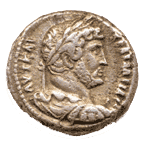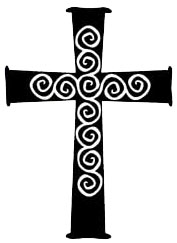|
The Rev. Frank
Logue The Things that Are
God’s “Render unto Caesar the thing’s which are Caesar’s.” These words of Jesus have become a sort of proverb and those who know little of scripture may still have heard “Render unto Caesar.” And why not? The encounter is so typical of Jesus in that his opponents are not only foiled in their attempts to discredit him, but Jesus uses their attack as a teachable moment. Digging a little deeper into this short encounter helps uncover some of the deeper currents in the exchange. At first the details behind may seem merely like vaguely interesting bits of trivia. But, if you’ll hang with me a bit, I think you’ll see that the background is very important. First, the combination of people approaching Jesus is intriguing. Matthew tells us that the Pharisees come together with the Herodians. This combination assures that someone is going to leave mad. For the Pharisees did not want to give money to their pagan oppressors and so were opposed to paying taxes to Rome. One the other hand, King Herod’s position of power came courtesy of the Romans, so the Herodians had a vested interest in keeping the Roman taxes paid. Therefore, the Pharisees and the Herodians each reflected one of the horns of the dilemma. The taxes were themselves widely considered to be oppressive. Rome had taxed Palestine since 63 B.C., but the problems really came to a head starting in 6 or 7 A.D. as the area around Jerusalem came under the direct control of Rome through its governor. By that point, the taxes included an agricultural tax and personal property tax in addition to various duties owed for goods. It is quite likely that no one yet knew how Jesus would respond to such a direct question, when either of the two answers was a clear trap:
With the right group assembled to confront the upstart Rabbi from Galilee, success would seem assured. But even in their approach to Jesus we see that his opponents had misjudged their target. For the Pharisees and Herodians approached Jesus with flattery, a technique bound to fail on the straight-talking Jesus. Then came the question, “Is it lawful to pay taxes to the Emperor or not?” This reference is obviously to Jewish Law, also called the Law of Moses. Clearly it was lawful to pay the tax by Rome’s standards, the question was whether it was proper for a Jew to do so. The specific question may well have been designed to put Jesus in a box. For the Law refers to the first five books of the Bible, known in Hebrew as “The Torah,” which means “teaching, instruction or law.” Jesus now needs to answer from scripture and to answer from those first five books. It would seem that they have presented their prey with no way out. He can’t speak against the tax for that would anger the Herodians and lead to a charge of treason against Rome. He could not speak in favor of the tax without alienating most of the crowds that followed him. And furthermore, his argument would have to be framed in terms of the first five books of the Bible and no one knew of a good text in those books to get Jesus out of the dilemma. Jesus calls the questioners “hypocrites” and then asks for one of the coins used in paying the tax. This is Jesus own trap for it proves at least one among the questioners to be a hypocrite. For the coin used for the tax was a silver Denarius. One Denarius was equal to a day’s pay for a common laborer. On the coin was the image of Caesar on one side and on the reverse the image of a woman named pax or personified peace. The coins were, strictly speaking, against Jewish law which prohibited graven images.
Jesus doesn’t pause to emphasize the point. Instead he asks the question which everyone in Israel could have answered without a coin in hand. In our reading for this morning, we used the New Revised Standard Version which said, “Whose head is this and whose title?” That translation misses the point. The word they translate as “head” is “icon,” a Greek word better translated “image.” The word “title” is better translated “Likeness.” This is a distinction of eternal importance as we shall see. When they answer Jesus question saying that the image and likeness are, “Caesar’s,” Jesus replies that they are to give to Caesar what is Caesar’s. Again, the translation covers something better revealed. It could also be translated “Give back” rather than “give” or “render.” Give Caesar back those things that are Caesar’s. It is his coin anyway, who cares if you give Caesar back his coin for the tax. Then Jesus gives the most amazing line of the short encounter when he continues by saying that we are to “give back to God the things that are God’s.” It leaves everyone calculating what exactly is God’s that I am supposed to give back. And in case you were wondering, the clue was the word “icon” or “image” and the word “likeness.” For Jesus had met the challenge and gave his answer in terms of The Torah. Jesus’ answer came from Genesis 1:26 and 27 which says, “And God said, “Let us make humankind in our image, according to our likeness,” and goes on to state “God created humankind in his Image, in the image of God he created them; male and female he created them.” The principal is this. The coin has Caesar’s icon on it, so it is Caesar’s. But we were made in the image and likeness of God. We are the icons of God, so we are God’s. No wonder they were amazed. Jesus cut right through their argument and disabled the trap so carefully set for him. Jesus affirmed the tax while making it irrelevant. Jesus implies that though we do owe the state there are limits to what we owe. Yet, Jesus places no limits regarding what we owe to God. No doubt, some preachers will use this text to talk about stewardship in terms of what you give to the church. But this is no passage on the tithe. For a tithe represents giving a tenth of what you make to God. My wife and I give 10% of our pre-tax income to King of Peace. Yet by the terms Jesus gives in this exchange, if that is all we do, we would fall well more than 90% shy of the mark. Jesus says that everything you have and everything you are is God’s already. You owe God 100% of who you are rather than a mere 10% of the money you make. You can’t give anything to God, it is a matter of giving back from what God has given you, for everything you have and everything you are is God’s already. You owe God nothing less than everything. While this would certainly apply to the money you make, the formula is not that you give 100% of your income to God, for God knows you need the money for the necessities of life. The teaching is that once you have given God some of the money you earn, don’t feel that you have bought off an obligation. God wants to share in some of your time and energy, so the 100% formula relates to your calendar as well as your wallet. God wants to be let into your day, and not just an hour of your Sunday. What God wants is nothing less than to come and abide in your heart, then little matters such as how much of your time and money go to the church will take care of themselves and a lot of other things will fall into line as well. The point isn’t giving time or money to a church. The point Jesus made so clearly is that you have been made in the image and likeness of God. God is proud of you. God loves you. God keeps your picture in the divine wallet and on the heavenly refrigerator. Jesus did not care about the tax, for his real concern was that you live into the image and likeness of the God who lovingly created you. You live into the image and likeness of God by conforming your life to be more like Jesus’ life. This doesn’t come through merely giving money to Caesar, to King of Peace or anywhere else. Through reading the Bible, prayer and worship, let God help you to sort out the details of your life. Begin to live into that image and likeness of God that is in you by giving back your heart to God, for it is God’s anyway. And when the time comes for communion in just a little while, I would encourage everyone, no matter what your denominational background, to come forward to receive the bread and wine of communion. And if you have not yet been baptized, then come forward for a blessing. For at this altar, we can meet Jesus anew, not just with head knowledge, but in your heart. Come forward reminded that you bear the image and likeness of God, and give your heart back to God once more. For in answer to the question, “What are the things that are God’s which we are to give back to God?” The answer is “You.” Amen. |

 You may recall the incident when Jesus chased money
changers from the outer courts of the Temple. These moneychangers had a
business because one was required to exchange pagan currency for Temple coins
before going to do business in the Temple. Carrying the image of Caesar into
the Temple was considered sinful. But note that when Jesus asks for a
Denarius, one is quickly located and handed to Jesus. No one ran out to the
moneychangers. No one received special permission to bring the sinful coin
into the Temple. No, it seems that Jesus’ opponents were caught carrying
Caesar’s image into the Temple.
You may recall the incident when Jesus chased money
changers from the outer courts of the Temple. These moneychangers had a
business because one was required to exchange pagan currency for Temple coins
before going to do business in the Temple. Carrying the image of Caesar into
the Temple was considered sinful. But note that when Jesus asks for a
Denarius, one is quickly located and handed to Jesus. No one ran out to the
moneychangers. No one received special permission to bring the sinful coin
into the Temple. No, it seems that Jesus’ opponents were caught carrying
Caesar’s image into the Temple. 